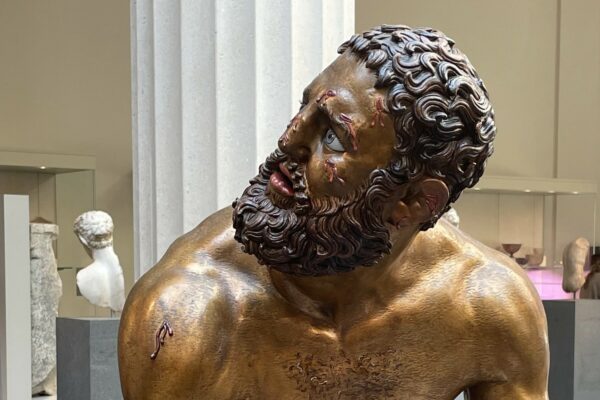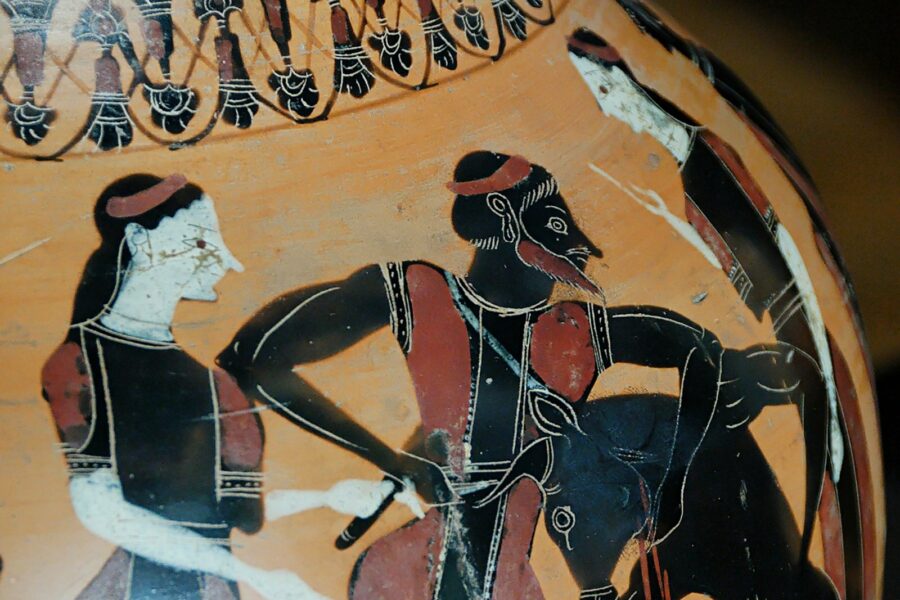
Ancient bullying often took the form of the dreaded noogie.
Meeting 1: In which the hero Theseus leaves destruction in his wake, mostly because he’s a jerk, and the Oracle of Delphi gets super high.
This episode of Mythology Pitch Meetings brought to you by CLAS-C 205 Classical Mythology.
Have you ever wondered how your favorite Classical Myths came to be? This is absolutely not how that happened, but it could have happened, maybe, and that’s the point of mythology. Shout-out to Ryan George, whose Pitch Meeting video series inspired the Muses.
CALLIOPE, MUSE OF EPIC POETRY: So you have a Classical Myth to pitch to me?
HOMER, UNCONTESTED G.O.A.T OF ANCIENT POETRY: Do I! This one is about a prince of Athens named Theseus.
CALLIOPE: What’s his deal?
HOMER: He’s the son of Aegeus, King of Athens, and after being raised in secret by his mother Aethra, he’s coming home to claim his birthright!
CALLIOPE: Why was he raised in secret?
HOMER: Because his father impregnated Aethra while he was married to someone else. In fact, when Aegeus met Aethra he was on a journey to ask the Oracle of Delphi why he couldn’t have any children with his wife.
CALLIOPE: Maybe because he was too busy with other women? But who is the Oracle of Delphi?
CLIO, MUSE OF HISTORY (interrupting): She’s this lass who sits on a crockpot over a chasm in the earth spewing noxious gas, so she gets high as a kite and then people stand around her and ask her questions. Like, about whether they should invade a neighboring kingdom, whether or not they will kill their parents, that sort of thing.
CALLIOPE: Wait, what? Why? Does that work as a source of information?
CLIO: Oh of course not—why would it? She’s just a hallucinating teenage girl spouting gibberish. But the priests who supposedly translate what she says report that she speaks in riddles, the sort of riddles that could really mean anything, so the priests are always right. They basically do a cold read of their clients, like Bradley Cooper will in Nightmare Alley.
CALLIOPE: Who?
CLIO: Never mind. But the Oracle of Delphi isn’t something Homer made up for the myth. It’s going to be a real historical phenomenon.
CALLIOPE: That will have to be a quirky fad.
CLIO: Nope, it will be one of the main ways Mediterranean leaders make decisions until the 4th century C.E. Roman emperors will consult the Oracle. The apostle Paul will complain about her.
HOMER: Anyway, back to Theseus. When he arrives at Athens, it turns out that his father King Aegeus has to pay a ransom of seven women and seven men each year to Minos, the king of Knossos in Crete. So Theseus volunteers to be one of the seven men!
CALLIOPE: Why does King Aegeus have to pay such a weird ransom to King Minos?
HOMER: Well, Minos’ son was accidentally killed by a bull running loose on Aegeus’ territory. So now Minos takes fourteen Athenians every year and feeds them to his monster the Minotaur!
CALLIOPE: That seems disproportionate. What’s the Minotaur?
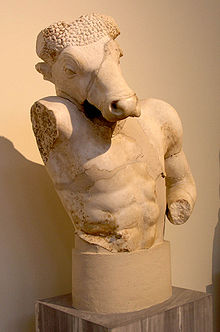
This is your body on ancient steroids.
HOMER: The Minotaur has the body of a man but the head of a bull! And he eats people! And he lives in a maze called the Labyrinth underneath King Minos’ palace!
CALLIOPE: Labyrinth, that’s a word I know! How did King Minos get a monster with the body of a man but the head of a bull?
HOMER (looks uncomfortable): I’d rather not say.
CALLIOPE: I think audiences will want to know.
HOMER: Um, well, when a bull and a woman love each other very much, they give each other a special hug…
CALLIOPE: Whoa, whoa, shut it down. We’ll save that for the HBO prequel series. It’s going to be pretty hard for Theseus to defeat this monster in a maze.
HOMER: Nope, it’s going to be super easy, barely an inconvenience. Lucky for Theseus, when he arrives on Crete the king’s daughter, Ariadne, sees him and falls madly in love with him.
CALLIOPE: Why?
HOMER: Because he’s a Greek hero. He’s ridiculously good looking. So she agrees to give him a magic ball of twine, which will wind its way into the labyrinth to the Minotaur. Then all Theseus has to do is follow the twine, kill the Minotaur, then follow the twine back out. Easy-peasy, lemon-squeezy.
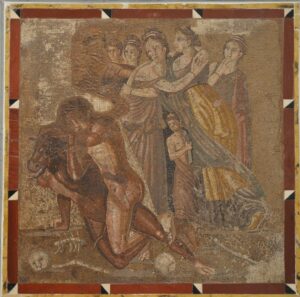
Ancient bachelorette parties were somewhat different from their modern counterparts.
CALLIOPE: Does Ariadne know Theseus is going to kill her father’s monster?
HOMER: Absolutely. And the Minotaur is her half-brother, too.
CALLIOPE: Wait, what?
HOMER: Prequel.
CALLIOPE: So she willingly helps this guy, whom she just met, defy her father and murder her half-brother. I bet this relationship will end well.
HOMER: Spoiler alert, it will not. But that’s for the sequel. Anyway, Theseus sails back to Athens in triumph, but he doesn’t change the ship’s sails from black to white. That’s the signal he and his father King Aegeus had agreed on, black for dead, white for alive. Aegeus is watching on the cliffs for his son’s safe return, and when he sees the black sails, he thinks Theseus is dead and he throws himself into the ocean!
CLIO: And that’s where we get the name of the Aegean Sea!
CALLIOPE (ignoring her sister): Why didn’t Theseus change the sails?
HOMER: He just forgot.
CALLIOPE: He forgot the signal that would tell his father he was still alive?
HOMER: He had a lot on his mind. He just slew a bull-monster.
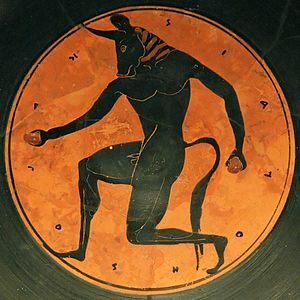
Flex.
CALLIOPE: So, the hero of this story takes advantage of a young girl to get her to help him kill her half-brother, then he…
HOMER: Abandons her on a desert island. Sequel!
CALLIOPE: …abandons her, and then carelessly causes his father’s suicide. And this is the guy we are supposed to be rooting for?
CLIO: He’s going to look super cool on ancient pots.
CALLIOPE: Sold.
Share on Instagram, or really wherever you want.
For more exploits of Theseus, and how myths of heroes shaped Ancient Greek and modern societies, enroll in CLAS-C 205 Classical Mythology, coming up in Summer I and II 2024 and Fall 2024, and earn GEC credits while you’re at it! Can’t get enough of Ancient Greece and Rome? Earn a Classics Minor in just 15 credits!



